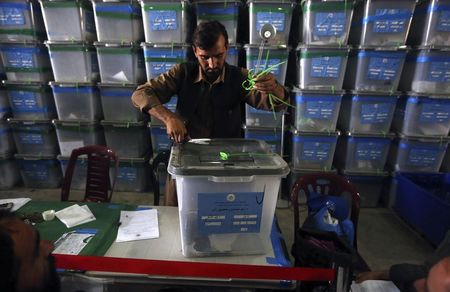Where do we start? Afghan unity talks at early impasse

By Hamid Shalizi and Jeremy Laurence
KABUL (Reuters) – The two men vying to become Afghanistan’s next leader may have shaken hands on a deal to resolve a bitterly disputed election, but they are miles apart on a critical component of their gentleman’s agreement – forming a united government.
Four months after Afghans first went to the polls to choose President Hamid Karzai’s successor, the final result could still be weeks, possibly months away, as hundreds of international monitors painstakingly audit the ballot – one vote at a time – to vet for fraud.
More worryingly, the two protagonists, Ashraf Ghani and Abdullah Abdullah, have not yet started work on the most difficult part of a pact brokered by U.S. Secretary of State John Kerry amid some fanfare: how they will share power.
“Ashraf Ghani is smart and not ready to sign these details now … because his camp believe they are winning, and why concede a huge amount of power to his rival?” a senior Afghan government official told Reuters.
Aides from the two camps admit that negotiations have stalled before they really began.
“The new joint agreement on the unity government brokered by John Kerry was verbal, but we are insisting it is signed on paper,” said Mahmoud Saikal, a top aide to Abdullah.
“The reason we want to sign it is because Ashraf Ghani’s team are divided between having or not having a unity government, so there is no guarantee. Our rivals are making excuses and are not willing to sign it now.”
Ghani’s aides said that, before sitting down to talks on the composition of a new government, the new president should be declared.
“We are absolutely sticking to the agreement between us brokered by John Kerry, but it has to happen after the audit is over,” said Tahir Zaheer.
FEARS OF INSTABILITY
Abdullah, the clear winner in the first round but who failed to secure an absolute majority, has blocked the election process by accusing Ghani and Karzai of colluding to skew the run-off result, which preliminary counts show Ghani won.
Tensions between the sides escalated at the weekend when Abdullah’s aides produced an audio tape allegedly showing Karzai’s deputy had orchestrated fraud in favour of Ghani. Ghani and Karzai’s camps dismissed the tape as a fake.
When Kerry flew into Kabul last month to try to rescue the democratic process, just months before most foreign troops are due to leave the country, Ghani and Abdullah agreed on a two-track approach: audit and recount all eight million votes from the June run-off and build an inclusive government.
While the vote recount was ambitious, the power-sharing agreement was deemed by experts to be a far greater challenge.
“What political figure gives serious and separate power to a rival who, eventually, will oppose him?,” asked Ronald Neumann, the U.S. ambassador to Afghanistan from 2005-07.
Observers fear that if the pair, who have both served as ministers under Karzai, fail to reach a compromise on an inclusive government, existing divisions between Afghanistan’s two main ethnic groups could deepen.
That would add to the instability being caused by a vicious insurgency led by the hardline Islamist Taliban movement, ousted from power by the U.S.-led war of 2001.
Preliminary results from the run-off put Ghani, who comes from the biggest Pashtun group based in the east and south, in front by about a million votes. Abdullah draws support mainly from the Tajik minority based in the north of the country.
Of particular concern in the West is how delays could complicate the signing of a security pact allowing some foreign troops to stay beyond a year-end deadline, with Afghan forces still ill-equipped to battle the insurgents alone.
AID ON THE LINE
The United States, Afghanistan’s biggest foreign donor, has promised billions of dollars in assistance in years to come, but Kerry has made it clear that aid was on the line if the democratic process was abandoned.
Sources say that under a proposed national unity government, the president would appoint a chief executive, a role which can later be changed to prime minister. Karzai has spoken out against the idea, saying it could stymie policy making.
Graeme Smith, a Kabul-based analyst with the International Crisis Group, said Ghani’s camp appeared to be most worried about the political deal.
“Ghani’s supporters say that a national unity government should not mean carving up the government into pieces controlled by the two sides,” he said.
After a shaky start, the first half of the Kerry deal is finally in full swing, with hundreds of international observers joining Ghani and Abdullah’s auditors ploughing through 23,000 ballot boxes at giant warehouses on the outskirts of Kabul.
As many as two million of the eight million votes cast could be thrown out, a Western diplomat said.
But with the more fundamental agreement on power sharing a distant prospect, a U.S. official said Kerry may have to intervene again to break the deadlock.
U.S. officials said that the problem lay not as much with the two candidates as with those surrounding them who all want a slice of power.
Thomas Ruttig, co-director of independent research organization Afghanistan Analysts Network in Kabul, said a new political culture had emerged since 2001.
“Government posts are seen as perks to which those who contribute to getting into power have a claim … and not so much as a mandate to work for the good of the nation,” he said.
(Additional reporting by Jessica Donati; Writing by Jeremy Laurence; Editing by Mike Collett-White)